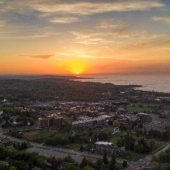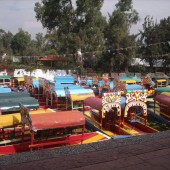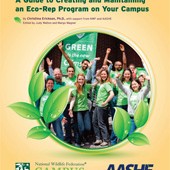
Abstract: Sustainability is a core value of Gen Z and is increasingly a focus of campus strategic plans. Undergraduate survey data can inform campus programming by increasing our understanding of student sustainability behaviors, knowledge, attitudes, and how these relate to student participation in curricular and cocurricular activities. Repeated surveys can track change over time in general and among underserved demographic segments of the student population. Here we evaluate the first in a series of biennial sustainability surveys that will guide planning at a mid-sized midwestern university in the USA. Our survey, modeled after existing surveys, was distributed to undergraduate students at the University of Minnesota Duluth (348 respondents) and collected demographic information including: college affiliation, year in school, gender, race/ethnicity, and campus residence. Our study showed that student knowledge scores were comparable to similar surveys at other institutions (66%) and the average attitude score was very high (88%). However, scores related to sustainability action were strikingly lower, indicating a gap between students’ understanding and acceptance of sustainability concepts and their willingness to engage, which we refer to as value-action gaps. When significant differences were detected between demographic groups, students who self-identified as female were more likely to have a higher sustainability score than students who identified as male and students who lived off campus were more likely to have a higher score than students who lived on campus. Other demographic results were mixed or not significant. We also noted a trend for students to score lower on questions related to business or economic sustainability and, similarly, for business students to score lower on sustainability questions overall than students in other colleges. Based on these baseline results, we provide recommendations to improve sustainability education and address the value-action gaps identified in this survey.
Continue Reading
The educational experience described in this article was developed in the course “Social and Cultural Contexts of Teaching” for the Sociology of Education bachelor’s degree at the National Pedagogical University, Mexico. In this course, students are expected to develop favorable attitudes toward the environment. The student’s defined environmental problems made a diagnosis and elaborated a case study, to discuss concrete solutions in their community. The educational experience included several moments: framing, joint planning of individual and group activities, and development of the case study. The balance of the results of the course was favorable; the group learned to work cooperatively, mutual trust prevailed within the teams, group agreements were respected, the group goal was clearly defined, and a case study was delineated and developed.
Continue Reading
As sustainability peer educator programs continue to develop on college and university campuses, it is important to consider how such programs define and manifest sustainability within their operations. In this article I review a guide, recently published by two international associations, for developing sustainability peer educator programs, and argue that it signals an insufficient approach to sustainability within such programs and that more attention is needed on the economic and social dimensions of sustainability.
Continue Reading